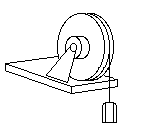Difference between revisions of "Inertia Wheel"
From UO Physics Demonstration Catalog
(Created page with "{{NewDemo|subject=Mechanics|topic=Rotational Dynamics|file1=Inertia_Wheel.gif}} This is an aluminum disk with two diameters which is free to rotate. The moment on inertia remains constant but it is possible to exert two different torques with a single mass. Set this at the edge of a table, roll a string around one of the diameters and attach a mass. The rate of fall is significantly different for the two diameters. '''Location:''' * Sh. B-3") |
|||
| Line 1: | Line 1: | ||
{{NewDemo|subject=Mechanics|topic=Rotational Dynamics|file1=Inertia_Wheel.gif}} | {{NewDemo|subject=Mechanics|topic=Rotational Dynamics|file1=Inertia_Wheel.gif}} | ||
This is an aluminum disk with two diameters which is free to rotate. The moment on inertia remains constant but it is possible to exert two different torques with a single mass. Set this at the edge of a table, roll a string around one of the diameters and attach a mass. The rate of fall is significantly different for the two diameters. | This is an aluminum disk with two diameters which is free to rotate. The moment on inertia remains constant but it is possible to exert two different torques with a single mass. Set this at the edge of a table, roll a string or tape (more visible) around one of the diameters and attach a mass. The rate of fall is significantly different for the two diameters. | ||
'''Location:''' | '''Location:''' | ||
* Sh. B-3 | * Sh. B-3 | ||
Revision as of 09:01, 7 December 2022
Return to Rotational Dynamics
Description:
This is an aluminum disk with two diameters which is free to rotate. The moment on inertia remains constant but it is possible to exert two different torques with a single mass. Set this at the edge of a table, roll a string or tape (more visible) around one of the diameters and attach a mass. The rate of fall is significantly different for the two diameters.
Location:
- Sh. B-3
